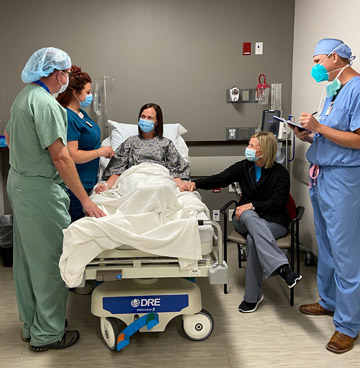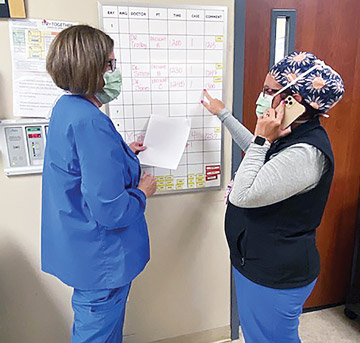The news came on Monday, April 6. Due to the coronavirus, visitors were no longer allowed to escort their loved ones to the operating rooms at the Hospital of the University of Pennsylvania (HUP) in Philadelphia. Ann Marie Morris, MSN, RN, CNOR, CSSGB, an associate clinical director of perioperative quality and safety, remembers her first thought: “If I were a patient, I’d be so frightened if I had to get dropped off and come into the hospital by myself. If I were a family member, I couldn’t imagine leaving my loved one at the door to fend for themself.”
Ms. Morris immediately went to work. She devised HUP’s Patient Receiving and Escort Process, which redeployed the hospital’s outpatient surgery center staff to meet patients at the hospital’s front door in the roles of greeters, scribes and escorts. They piloted the program on Wednesday. It was up and running the next day and remained in action for six weeks.
The willingness of the entire outpatient surgery staff to step outside of their usual roles and go the extra mile for anxious patients and their loved ones make HUP the winner of the 2020 OR Excellence Award for Patient Satisfaction.
Ms. Morris and Joyce Stengel, HUP’s perioperative coordinator of quality education, worked with the hospital’s security department to get access to the vehicle lane closest to the facility’s front doors. Automated pre-op calls were replaced with personal calls, so staff could tell patients and families to look for the greeters at the front door, and to be prepared that only the patient would be allowed to enter the hospital.
Elective procedures at HUP’s outpatient surgery center were canceled. Nurses, surgical techs and clerical staff from the surgery center were redeployed into three-person teams that greeted vehicles from 5 a.m. until the last surgery patient of the day had arrived.
“The roles were interchangeable and integral to our success,” says Ms. Morris. “Nurses handled the clinical questions, those who were the most enthusiastic were tapped as greeters and staffers with the best handwriting were assigned as scribes because there was no time to get electronic tablets. The remainder served as patient escorts.”
The hospital’s entrance was a chaotic place as the valet service was canceled due to COVID-19 restrictions, so the new teams wound up doing much more than greeting surgery cases. Vehicles arrived with people looking for the ER or for non-emergency appointments. “We were triaging cars to find the surgery patients,” says Ms. Morris.
Some of the arrivals were heart or cancer patients who were scheduled for serious surgeries. “Looking at the faces of some of the families in the car, it was clear what they were thinking, ‘I might never see my loved one again. We might be saying goodbye right here,’” says Ms. Morris.
The greeter acted as the team leader who reviewed patient information, provided updates about COVID-19 protocols, collected contact numbers from family members, asked about patients’ mobility levels and helped patients don a mask, says Carolyn Grous, RN, MSN, CNOR, HUP’s director of perioperative services – compliance.
Family members often had helpful information about their loved ones’ previous surgeries or questions about whether daily medications might interact badly with the anesthesia their relative was about to receive. The scribes wrote those concerns down and got them to the OR team. The escorts guided patients to the surgery floor.
Some patients, young and old, don’t think clearly when they arrive for surgery due to nerves and anxiety. They often won’t speak up and rely on loved ones who brought them to relay important information to caregivers, as well as to navigate the hospital so they don’t get lost. That wasn’t possible with the COVID-19 restrictions in place.
.svg?sfvrsn=be606e78_3)


.svg?sfvrsn=56b2f850_5)